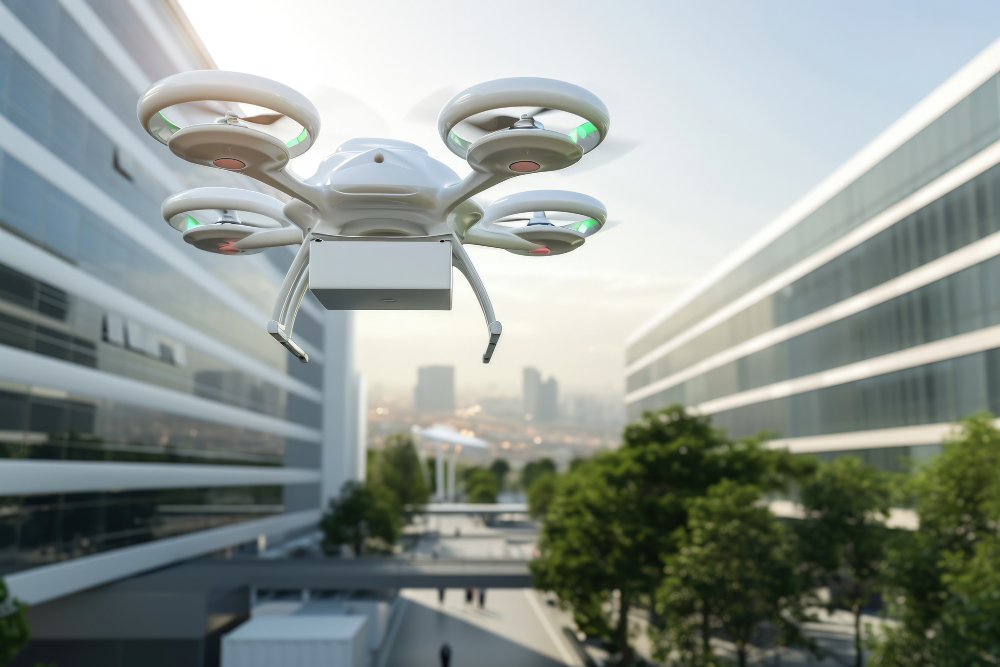
The age of traditional CCTV and static surveillance is rapidly evolving, giving way to drone surveillance, a revolutionary security solution reshaping how businesses monitor, protect, and manage their physical assets. These high-tech aerial tools offer real-time data capture, 360-degree visibility, and rapid deployment capabilities, making them ideal for warehouses, corporate campuses, industrial facilities, and high-risk retail environments.
With increasing threats such as theft, perimeter breaches, and unauthorized access, businesses must adapt by incorporating intelligent drone-based security systems. Equipped with thermal imaging, night vision, and AI-powered analytics, modern surveillance drones provide unmatched oversight that static systems simply can’t replicate.
Key Benefits of Drone Surveillance for Businesses
Drone surveillance offers businesses smarter security, real-time monitoring, and cost-effective oversight. Here’s how it can enhance your operations.
1. Enhanced Perimeter Monitoring
Unlike traditional systems with fixed angles and limited coverage, drones can patrol vast areas in minutes, offering a dynamic, mobile eye in the sky. This proves invaluable for companies with expansive properties or vulnerable outdoor zones such as construction sites, logistics hubs, or energy plants.
2. Real-Time Threat Detection and Response
Drones equipped with live-feed transmission allow security teams to detect suspicious activity instantly, reducing reaction times. When integrated with AI, drones can automatically recognize anomalies, follow intruders, and notify authorities, minimizing potential damage or loss.
3. Cost-Effective Long-Term Solution
Though the initial setup may require investment, drones can reduce reliance on human security patrols and minimize the infrastructure costs tied to traditional surveillance. Fewer blind spots mean less vulnerability and fewer incidents, saving companies from potential losses or legal liabilities.
4. Data Collection and Reporting Capabilities
Today’s drones are more than just flying cameras. They act as data collection hubs, storing high-resolution images and footage for audit trails, insurance claims, and incident investigation. Some drones even support predictive maintenance algorithms, alerting businesses about structural or environmental risks before incidents occur.
Is Drone Surveillance Legal and Compliant in India?
Before deploying drone technology, businesses in India must adhere to the DGCA (Directorate General of Civil Aviation) guidelines. As per the Unmanned Aircraft System (UAS) Rules 2021, commercial entities must:
– Register drones under the Digital Sky platform
– Obtain a valid Drone Operator Permit
– Comply with no-fly zones and altitude restrictions
– Maintain privacy standards and avoid unauthorized data capture
Businesses should always ensure they are working with licensed drone service providers who are fully aware of compliance issues to avoid regulatory penalties.
Industries That Can Benefit Most from Drone Surveillance
Drone surveillance is boosting safety, efficiency, and monitoring across sectors. Here are the industries gaining the most from this smart technology.
1. Manufacturing and Industrial Plants
Monitoring inventory yards, loading docks, and hazardous areas becomes seamless with drones. Their thermal imaging capability can also identify overheating equipment or fire hazards, ensuring worker safety.
2. Logistics and Warehousing
Drones provide real-time inventory scanning, asset tracking, and route monitoring, helping companies in Gurgaon, Delhi NCR, and other metro hubs improve both security and operational efficiency.
3. Retail and Commercial Complexes
Large malls or retail parks face unique security challenges. Drones can track foot traffic patterns, monitor parking areas, and assist during crowd control or emergency evacuations.
4. Construction Sites
Construction zones are hotspots for unauthorized entry, material theft, and safety violations. Drones not only deter crime but can also assist with progress tracking and site inspections.
Drone Surveillance and AI – A Match Made for Security
Pairing drone technology with artificial intelligence transforms surveillance into a proactive security protocol. AI-enabled drones can:
– Recognize facial patterns and vehicle license plates
– Detect unusual movement patterns
– Trigger alarms based on behavioral analytics
– Integrate with existing security systems (access control, alarms, etc.)
This integration creates a multi-layered security ecosystem, giving business owners peace of mind while enhancing responsiveness and precision.
Challenges Businesses Must Overcome for Drone Integration
While drones offer great benefits, businesses face hurdles like regulations, costs, and technical issues. Here are the main challenges to consider.
1. Weather Dependence
Extreme wind, rain, or heat may impair drone functionality. Businesses must have weather-resilient drone models or backup surveillance options.
2. Airspace Restrictions
Certain areas, especially near airports, government facilities, or defense zones, are restricted. Operating drones in these areas requires special clearances, which can be a hurdle.
3. Data Security and Privacy Concerns
As drones capture high volumes of sensitive data, businesses must ensure secure data encryption, cloud storage compliance, and restricted access to prevent misuse or cyber threats.
How to Get Your Business Drone-Ready
To ensure a smooth transition into drone surveillance, businesses must follow a strategic approach:
Conduct a Security Audit– Evaluate current surveillance capabilities and identify gaps.
Set Surveillance Objectives – Define what areas need monitoring and what outcomes are expected.
Choose the Right Equipment – Pick drones with suitable features such as night vision, motion detection, and autonomous navigation.
Train Your Security Staff – Equip your personnel with knowledge of drone operations, emergency protocols, and software handling.
Collaborate with Certified Providers – Work with experienced drone surveillance firms familiar with industry regulations and tech integrations.
Future of Drone Surveillance in Corporate Security
The future is autonomous. With developments in 5G, cloud computing, and machine learning, drones will not only monitor but also forecast threats, optimize patrol routes, and collaborate with robots for complete automated facility management. As businesses strive to create smart, safe workplaces, drones are poised to become integral to next-generation corporate security frameworks.
